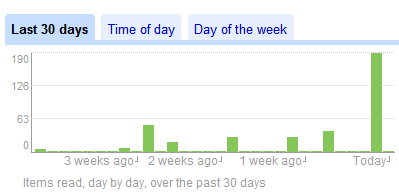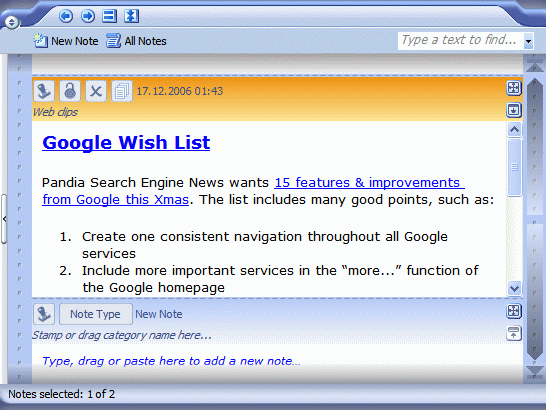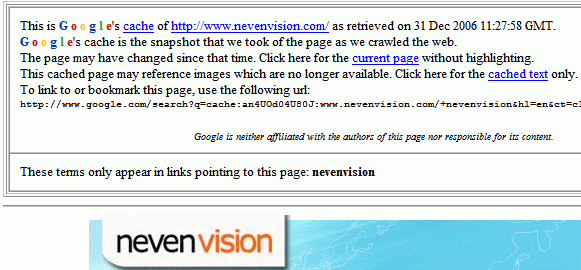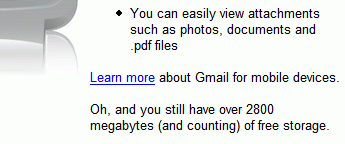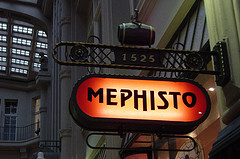
Press releases are boring, but the about section from the end (or the boilerplate) could tell you a lot about a company. Here are some excerpts from
Google's press releases over the years.
1999:
-"
Google is dedicated to providing the best search experience on the web. Google has its own search destination site at http://google.com. Google also offers co-branded solutions for information content providers. Google was founded in September 1998 by Larry Page and Sergey Brin, building on three years of research as computer science Ph.D. candidates at Stanford University. Traffic has been growing at a rate of 50% per month since Google's inception, fueled only by
word of mouth."
1999-2000:
-"Google was founded in 1998 by Stanford University Ph.D. candidates Larry Page and Sergey Brin to create
a new generation of powerful, scalable search engine products to improve the user experience of searching the web. Based on three years of advanced research in computer science, Google is dedicated to providing the best user search experience by delivering a powerful, yet simple-to-use format for finding the most relevant answers to search queries."
2000:
-"
Google exists to provide the world's best Internet search experience. Google accomplishes this for millions of users daily by delivering a powerful, fast, and easy way to find the most relevant information available. Google's technological innovations have powered the company to numerous awards, including a 2000 Webby and People's Voice Award For Best Technical Achievement; Best Search Engine on the Internet from Yahoo! Internet Life; Top Ten Best Cybertech of 1999 by TIME magazine; Technical Excellence Award from PC Magazine; and Best Search Engine by The Net."
2001-2002:
-"With
the largest index of websites available on the World Wide Web and the industry's most advanced search technology, Google Inc. delivers the fastest and easiest way to find relevant information on the Internet. (...) A growing number of companies worldwide, including Yahoo! and its international properties, Sony Corporation and its global affiliates, Netscape, and Cisco Systems, rely on Google to power search on their websites."
(at some point in) 2004:
-"Google is a global technology leader focused on
improving the way people connect with information. Google's innovations in web search and advertising have made its website a top Internet destination and its brand one of the most recognized in the world. Google maintains the world's largest online index of websites and other content, and Google makes this information freely available to anyone with an Internet connection. Google's automated search technology helps people obtain nearly instant access to relevant information from its vast online index."
2003-now:
-"Google's innovative search technologies connect millions of people around the world with information every day. Founded in 1998 by Stanford Ph.D. students Larry Page and Sergey Brin, Google today is
a top web property in all major global markets. Google's targeted advertising program provides businesses of all sizes with measurable results, while enhancing the overall web experience for users. Google is headquartered in Silicon Valley with offices throughout the Americas, Europe and Asia."
2006 (
April Fool's Day edition):
-"Google's innovative search technologies connect millions of people around the world with information every second of every minute of every hour of every day. Founded in 1998 by Stanford Ph.D. wannabes Larry Page and Sergey Brin, Google today is a top web property in all major global markets and a very large number of minor ones. Google's targeted advertising program provides businesses of all sizes with measurable results, while enhancing the overall web experience for those users who haven't tuned out of online commerce altogether. Most Google lava lamps and bean bag chairs are located in Silicon Valley, though numerous such lamps and chairs can also be found in offices throughout the Americas, Europe, and Asia."
Trying to provide the best search engine and to improve the way people connect with information, Google became a great brand and a top web property thanks to the word of the mouth, the important awards received and the collaboration with Yahoo, Netscape and other companies. Independent of platform, browser or language, Google conquered the world by being fast, easy to use and friendly.
Here are some definitions for Google
from 1999:
Larry Page: "Google fills a real void in the Internet precisely because we have a manic passion for pure, unadulterated search."
Sergey Brin: "Google strives to get Internet users to the information they want as quickly and efficiently as possible, and that's all we do. We've engendered such strong loyalty because Google provides the purest and most powerful search experience on the web."
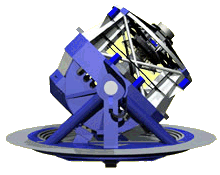 Associated Press reports that Google will help scientists "build a huge sky-scanning telescope" that will give people access to "digital footage of asteroids, supernovas and distant galaxies".
Associated Press reports that Google will help scientists "build a huge sky-scanning telescope" that will give people access to "digital footage of asteroids, supernovas and distant galaxies". 
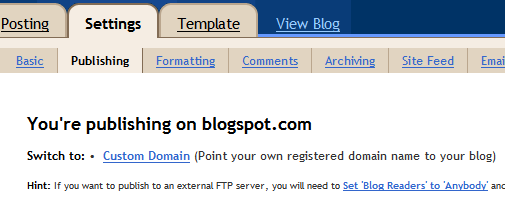






 If you'd like to have a Google Start Menu, (the unofficial)
If you'd like to have a Google Start Menu, (the unofficial) 